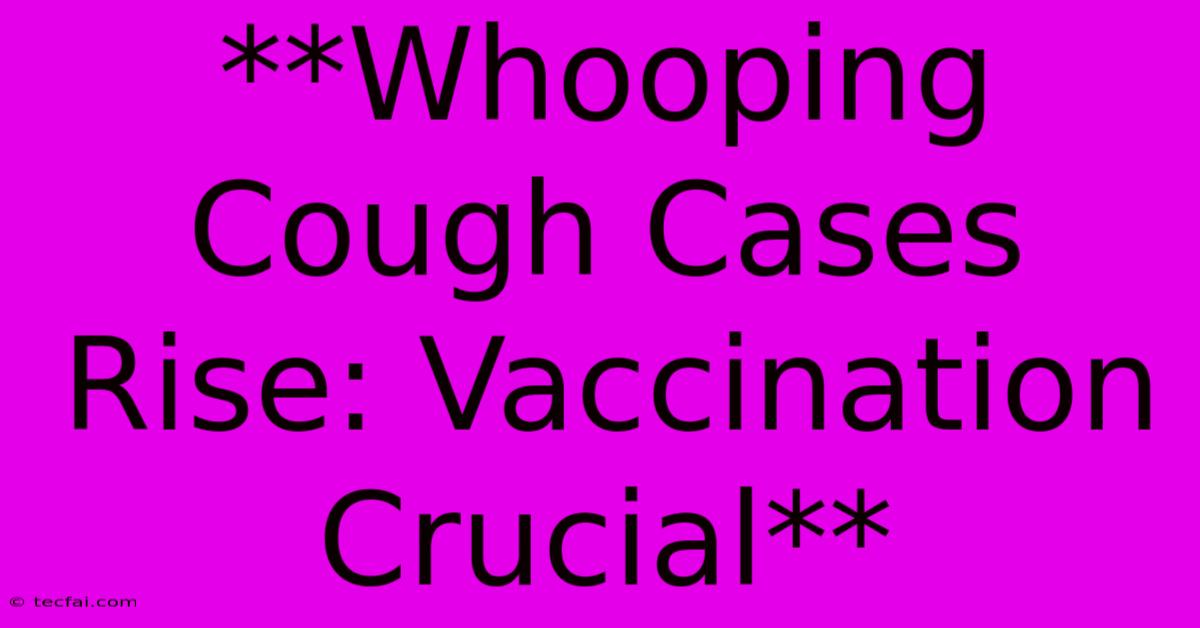**Whooping Cough Cases Rise: Vaccination Crucial**

Discover more detailed and exciting information on our website. Click the link below to start your adventure: Visit Best Website tecfai.com. Don't miss out!
Table of Contents
Whooping Cough Cases Rise: Vaccination Crucial for Protecting Your Family
Whooping cough, also known as pertussis, is a highly contagious respiratory infection that can be serious, especially for infants and young children. Recent data shows a concerning rise in whooping cough cases across the globe, highlighting the importance of vaccination and other preventive measures.
Understanding the Threat of Whooping Cough
Whooping cough is caused by the bacterium Bordetella pertussis. It spreads easily through the air when an infected person coughs or sneezes. Symptoms usually begin with a cold-like illness, but can progress to severe coughing fits that can last for weeks. The "whoop" sound is a distinctive, high-pitched inhale that occurs after a coughing fit.
While whooping cough can affect people of all ages, infants and young children are most vulnerable. Infants under 1 year old are at highest risk of serious complications, including pneumonia, seizures, brain damage, and even death.
The Urgent Need for Vaccination
The best way to protect yourself and your loved ones from whooping cough is through vaccination. The pertussis vaccine is highly effective and safe.
Here's why vaccination is crucial:
- Protection from severe illness: Vaccination significantly reduces the risk of developing whooping cough and its serious complications.
- Herd immunity: When a high percentage of the population is vaccinated, it helps protect those who are unable to receive the vaccine, such as infants too young to be vaccinated or individuals with weakened immune systems.
- Reduced spread: Vaccination helps to decrease the spread of whooping cough in the community, protecting everyone.
Who Should Get Vaccinated?
The Centers for Disease Control and Prevention (CDC) recommends that all children and adults receive the pertussis vaccine.
- Children: Infants receive the pertussis vaccine as part of the DTaP (diphtheria, tetanus, and pertussis) series. Booster doses are recommended throughout childhood.
- Adults: Adults should receive a Tdap (tetanus, diphtheria, and pertussis) booster every 10 years.
- Pregnant women: Pregnant women should receive a Tdap booster during each pregnancy, ideally between 27 and 36 weeks, to provide protection to their newborn baby.
Beyond Vaccination: Additional Preventive Measures
While vaccination is the most effective way to prevent whooping cough, other preventive measures can also help:
- Frequent handwashing: Wash your hands frequently with soap and water, especially after contact with someone who is sick.
- Covering coughs and sneezes: Cover your mouth and nose with a tissue or your elbow when coughing or sneezing.
- Staying home when sick: If you are sick, stay home to avoid spreading the infection.
What to Do if You Suspect Whooping Cough
If you suspect you or your child has whooping cough, it's important to see a doctor right away. Early diagnosis and treatment are key to preventing complications.
Protecting Your Family
Whooping cough is a serious threat, but with vaccination and other preventive measures, we can protect ourselves and our loved ones. Talk to your doctor about ensuring everyone in your family is up-to-date on their pertussis vaccinations. Together, we can make a difference in preventing the spread of this dangerous disease.

Thank you for visiting our website wich cover about **Whooping Cough Cases Rise: Vaccination Crucial**. We hope the information provided has been useful to you. Feel free to contact us if you have any questions or need further assistance. See you next time and dont miss to bookmark.
Featured Posts
-
Brampton Strike 1 200 City Workers Walk Out
Nov 08, 2024
-
Redmaynes Unseen Performance
Nov 08, 2024
-
Unrecognizable Brad Pitt On The One Show
Nov 08, 2024
-
Macdonald Bridge Closed Overnight Evacuations And Free Transit
Nov 08, 2024
-
Man United Vs Paok Europa League Live Stream
Nov 08, 2024
